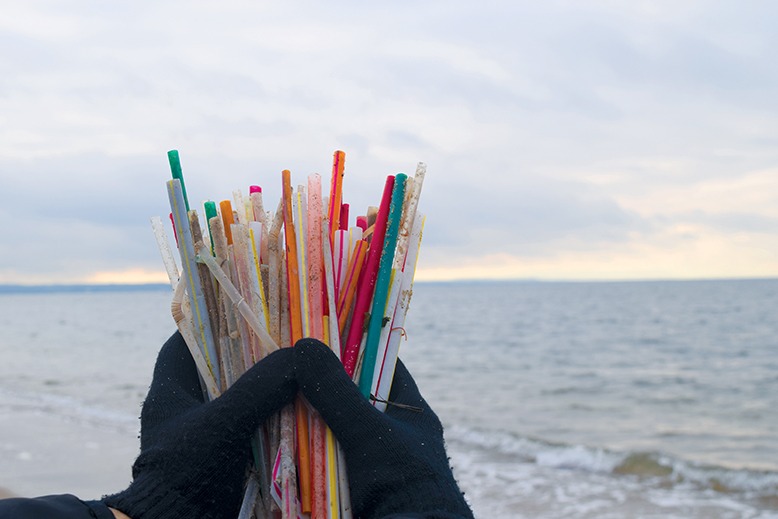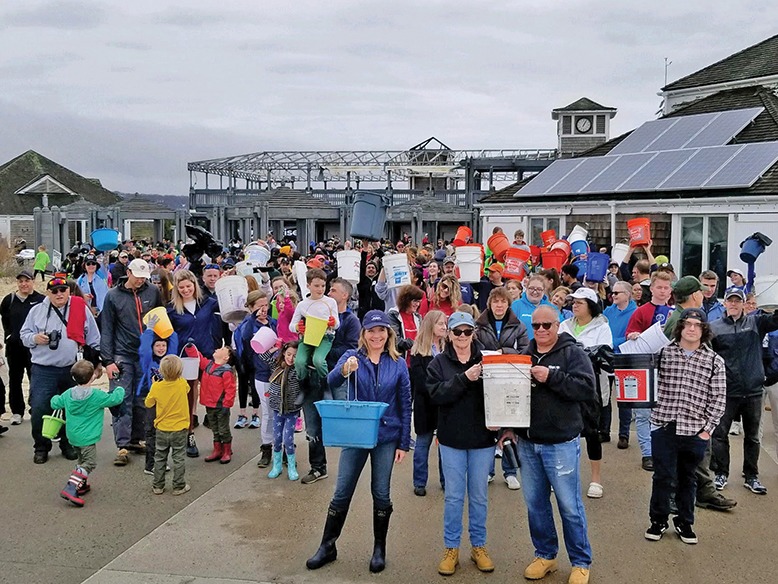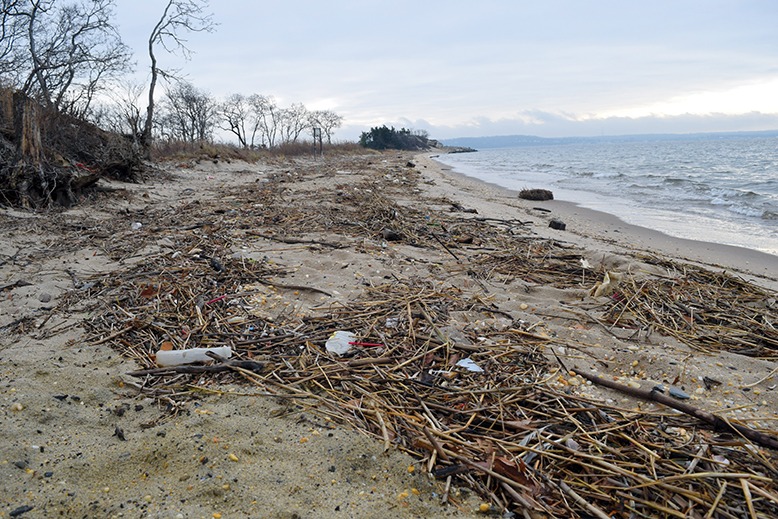
Courtesy of Clean Ocean Action
Much has changed over the 35 years that Clean Ocean Action has conducted beach sweeps along the Jersey Shore. When the Long Branch–based nonprofit first combed the beaches, cigarette butts and metal soda tabs were the most common bits of trash recovered. In recent years, plastic objects—including food containers, shopping bags, trash bags, cups, lids, straws and stirrers—are being retrieved in large numbers.
But starting next May 4, this, too, can be expected to change. That’s the date when New Jersey’s statewide ban on most single-use plastics is scheduled to kick in. The legislation, S864, is considered the country’s strongest ban on single-use bags. It even defines what kind of reusable bag can be sold in stores: one that is made of polypropylene, PET nonwoven fabric, nylon, cloth, hemp product, or another machine-washable fabric; has stitched handles; and is designed and manufactured for multiple reuse.
“It’s the one piece of legislation that will actually impact every person in New Jersey,” says JoAnn Gemenden, executive director of New Jersey Clean Communities Council (NJCCC), which was created in 1986 to help clean up litter in communities across the state.
The plastics legislation, signed into law in November 2020 by Governor Phil Murphy, bans single-use plastic bags in all stores and food-service businesses statewide. It also prohibits paper bags in grocery stores larger than 2,500 square feet, as well as large retailers like Target and Walmart. The ban also applies to polystyrene food containers, cups and other items. The bill also addresses single-use plastic straws, requiring restaurants to provide them only upon request, starting this November. The provision was made in consideration of differently abled people who may need a straw to enjoy a meal outside their home.
The statewide ban came on the heels of local ordinances banning plastic bags in 120 municipalities. That put pressure on state legislators.
“Municipalities from Essex County to Cape May, Mercer to Ocean, were passing ordinances saying, ‘We want to do our part to end single-use plastics pollution,’” says Jennifer Coffey, executive director of the Association of New Jersey Environmental Commissions (ANJEC).
The new law challenges our culture of plastic. “This law is all about changing habits,” says Gemenden. “I’m hoping this will also mean a cleaner New Jersey.”
And while few would disagree with that goal, the ban has its opponents, including business groups that say it’s just one more way of increasing the cost of doing business in New Jersey.

Instead of plastic bags, volunteers brought reusable buckets to this Clean Ocean Action beach sweep in 2019. Clean Ocean Action
It’s hard for anyone in New Jersey to argue against cleaner beaches—whether on the ocean, bays or rivers. Since the first beach sweep by Clean Ocean Action (COA) in 1985, nearly 150,000 volunteers have picked up approximately 7.5 million pieces of debris. Plastics make up almost 80 percent of all the trash recovered at the Jersey Shore, according to COA data for 2020. The same 2020 report states plastics made up 90 percent of trash found along the Delaware River between 2016 and 2019. COA is hardly the only group concerned.
“What seems as insignificant as a straw can be extremely harmful to everything that’s indigenous in the water,” says Vicki Clark, president of the Cape May County Chamber of Commerce. Plastics pollution not only hurts the environment and wildlife, says Clark, it also negatively impacts the state’s economy. Decades ago, when dead and dying dolphins were washing up on beaches, it turned off vacationers.
“The tourism economy is very dependent on a clean environment,” says Clark, “so we take it seriously.” In Cape May County, tourism is a nearly $7 billion industry supporting approximately 31,670 jobs, directly and indirectly. Not surprisingly, some of the county’s municipalities were among the early adopters of plastic-bag bans, and many businesses embraced the greener practices. “They had a customer base that appreciated that,” says Clark.
New Jersey is also home to the country’s second largest fishing industry. “They have been very negatively impacted because of the impact on the fish,” says Melanie Willoughby, executive director of the New Jersey Business Action Center (NJBAC). “We want to clean up the waterways by changing people’s habits.”
Indeed, COA’s Kari Martin says all the beach debris is fallout from our culture of plastic. “You are just given the utensils and straws in a bag without them asking you or without someone saying, ‘I don’t need it,’” she says. “We knew it was becoming a problem, but the extent has become a plague on our waters and beaches. We can’t recycle our way out of this.”

Debris that floated ashore on this Sandy Hook beach includes plastic straws, bags and cups—all of which deface the seashore and pose a threat to wildlife. Clean Ocean Action
In fact, only 20 percent of what consumers put into the recycling bin actually gets recycled and reused, says Coffey. The other 80 percent is burned or, until recently, was being shipped to other countries like China, India, Indonesia and Thailand. In recent years, some of those countries have refused to take any more of America’s trash, forcing states like New Jersey to rethink plastics altogether.
Bill S864 was not the first attempt by state lawmakers to address plastics pollution. In 2018, the legislators offered an industry-backed bill that the governor ultimately vetoed. “It was a do-nothing bill,” says Coffey. The measures wouldn’t have taken effect for 30 to 50 years. “It took too long and did too little to accomplish anything, so we asked Murphy to veto it, and he did. That left us back at the drawing board.”
Coffey turned to the local level. Later in 2018, she addressed more than 300 local officials at the annual statewide Environmental Congress and asked them to take action. ANJEC drafted a template ordinance for municipalities to consider and held regional forums, each of which brought together 150–250 people—including elected officials, environmental commissioners, business representatives and others—to discuss the impact of single-use plastics. Municipalities sent local representatives to Trenton to lobby for a ban, and many passed bans of their own. “We started to see massive amounts of ordinances,” says Coffey.
Lambertville was an early adopter, passing its ban on plastic bags and straws, as well as polystyrene, in September 2018. “At the time, it was one of the strongest municipal ordinances in the state,” says Liz Magill Peer, who chairs the Lambertville Environmental Commission. The ordinance gave businesses time to transition away from single-use plastics before it took effect in January 2020. During that grace period, Magill Peer and her team applied for and were awarded a $20,000 Sustainable Jersey grant to support their Ditching Disposables campaign, which later became a model for other municipalities.
The campaign included an event to show residents how to make T-shirts into tote bags, some of which were donated to the local food bank. Lambertville also sponsored a public appearance by a sustainability expert. Volunteers went door-to-door to speak with residents about the local ordinance and distributed two reusable bags to every household.
“It was important to us that we educated our residents about the ordinance so that they would be compassionate and understanding of local businesses,” says Magill Peer.
Lambertville hosted a forum for local businesses and created the Green Business Awards to recognize the ongoing efforts of local businesses to improve their sustainability practices. “We want to support our businesses in the transition,” says Magill Peer. “We don’t want it to feel like a burden.”
Elsewhere, the shopping mecca of Paramus passed its ordinance in 2019, banning single-use plastic bags and polystyrene foam. Despite having three major indoor malls and countless strip malls along Routes 17 and 4, retailers in Paramus reportedly were not concerned. “We really didn’t get much pushback from the malls,” says Paramus Environmental Commission Chair Tony Landa. “Nationwide, a lot of towns have gone to paper bags, and most of the malls house nationwide retailers,” he says. “They just had to order the paper bags and stop ordering the plastic bags.”
Paramus grocers had a different perspective. They were concerned their customers would drive to neighboring towns to shop where they could get plastic bags. “That was a shift for me to start supporting a statewide ban,” says Landa.
By 2020, when the state Legislature was pondering the ban, 120 local ordinances had passed; that number has since grown to 130. “That really forced the attention of the senators,” says Coffey. She adds that the plastics and chemical industries fought hard against the state bill. “They don’t like it, but it’s the right thing to do,” she says.
***
The Chemistry Council of New Jersey (CCNJ), which represents the interests of some plastics and polystyrene manufacturers, was among the entities that opposed the bill. “Those issues were rushed through legislation without a real analysis of the impact,” says Dennis Hart, CCNJ’s executive director. He adds that his organization did not have a position on the plastic-bag ban, since it does not represent any plastic-bag manufacturers, but it did strongly oppose the polystyrene ban.
Polystyrene, says Hart, is less harmful for the environment than the alternative paper products. “It takes more energy, more transportation costs, and more raw materials for cardboard food containers and coffee cups,” he says. What’s more, he says, polystyrene recycling is growing in popularity in towns across the state. Residents can either leave big pieces of polystyrene, usually from packaging, at their curb or drop them off at local centers. The polystyrene is then processed and sold to manufacturers to make other products, like picture frames and crown molding.
“It’s an emerging market,” says Hart. “The issue with it is that policy makers haven’t focused on it.”
There’s also ongoing research on different biodegradable polystyrene materials, says Hart, but those products wouldn’t be allowed under the ban. “We are in a moment in time where I think we are going to hurt the innovation of the future,” he says.
The New Jersey Business & Industry Association (NJBIA) also opposed the polystyrene ban, saying it was approved before “an adequate, cost-effective alternative” was available. “Everyone can see that this is going to be a more expensive proposition,” says Ray Cantor, NJBIA’s vice president of government affairs. The ban, he says, is going to especially hurt food-service businesses. “Their profit margins are not wide, so when you increase the costs from polystyrene to more expensive ones, it makes a business much more difficult and less profitable,” says Cantor. “When you add up all the other costs of doing business in New Jersey, it makes it difficult to do business in this state.”
What’s more, Cantor says NJBIA’s members have expressed concern that the ban is going to create confusion for businesses and customers. “This is not a simple ban where you know exactly what you can and cannot use for your business,” he says. “We also want to ensure customers have the right expectations as well, and they don’t get mad at businesses that cannot provide the same level of services as they did before.”
***
The statewide legislation includes $500,000 a year for three years to fund a campaign to educate businesses and consumers on the changes. Multiple state agencies and industry associations—including the New Jersey Food Council, the Department of Environmental Protection, NJBAC, NJCCC and NJBIA—are working together on Bag Up NJ, which officially launched in May 2021.
“We are trying to engage every single person and every population,” says Gemenden. That includes people in hard-to-reach communities and those who are not native English speakers. “We have a lot of work to go,” she says.
The campaign’s website has information about the ban, including explanatory charts for stores to display. A chat function for business owners to get immediate answers to questions during the workday is also in the works.
While businesses across the state exhaust their remaining single-use plastics and polystyrene supplies, the Bag Up NJ team is putting together a list of approved alternative-product vendors and organizing forums for owners to learn more. “There are businesses that are very excited because they’ve already been doing this,” says Willoughby. “There are others that are going to need guidance on how they can comply.”
Businesses most impacted by the ban are large grocery stores, many of which have already started offering reusable bags for sale. “My members are extremely engaged, and they are ready to roll this out,” says Linda Doherty, president and CEO of the New Jersey Food Council, representing more than 1,600 large and small food sellers and distributors across the state. “We are community leaders, and the health and wellness of our communities depend on our grocery stores. This is just an extension of keeping our communities clean and giving our residents an opportunity to participate in a program where they can also do their part by bringing a reusable bag or alternative.” She adds that club stores like BJs and Costco have never used bags, and that some customers have gotten creative with alternatives, even bringing laundry baskets with them to carry items back to their cars.
Some consumers may expect stores to make paper bags available for an extra 10 cents, as has been the case in other states with plastic bans. But advocates of the ban don’t like that trade-off.
Producing paper bags uses three times the energy and four times the water as making plastic bags, says Coffey. “That’s a huge carbon footprint,” she says. “We didn’t want to exchange one issue for another.” So ANJEC asked New Jersey lawmakers to limit paper in the bill. Small retailers and mall retailers like Macy’s will be allowed to use paper.
[RELATED: Love the Jersey Shore? Help Protect It This Summer]
The ban does not prohibit all plastic from grocery stores. Certain items, like deli meats and cheese, will still be given to customers in plastic bags. For two years after the bill is effective, other exceptions will include polystyrene trays for raw and butchered meat, lidded portion cups of two ounces or less, and food products prepackaged by manufacturers.
Environmental activists, local officials and state lawmakers have a clear message: There needs to be a change.
“Consumers can make a huge impact here,” says Martin, of COA. “People can make better daily choices when they are making purchases. Choose less packaging, less plastic, less single-use. Make those initial purchases for reusable items, whether beverage bottles or containers, because with each cup and straw that you don’t use, you are sending a message to manufacturers that we don’t need these items or want to use these items.”
We certainly don’t need them as part of the seascape at the Jersey Shore.



